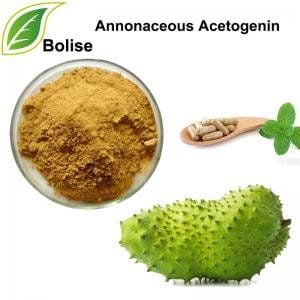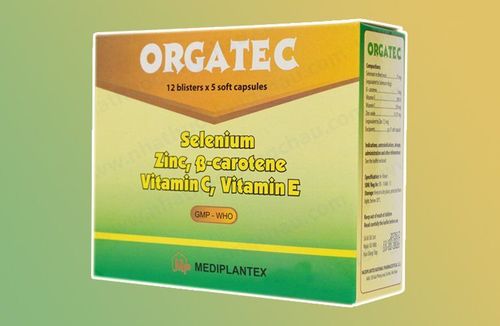Written by Mai Viễn Phương, MSC, MD Head of the Digestive Endoscopy Unit, Department of Outpatient & Internal Medicine, Vinmec Central Park International General Hospital.
Soursop and other plants have been shown to contain promising compounds that could be used in cancer treatment. It originates from tropical and subtropical regions around the world, is extracted from the Annona muricata tree, and contains compounds that are particularly effective against cancer cells.
1. What is soursop (Annona muricata)?
Soursop (Annona muricata) is a small evergreen tree found in the tropical forests of South America, Africa, and Southeast Asia. In Vietnam, it is commonly known as "cây mãng cầu xiêm." The tree produces heart-shaped, edible fruit, which is used to make candies, syrups, and other delicious treats.
However, it is not just a "sweet gift." Soursop also has antibacterial and antioxidant properties. This has led some scientists to explore soursop as a potential treatment for a range of serious diseases, including cancer.
Although some laboratory studies suggest that soursop may have anticancer properties, there is no clinical evidence showing that soursop can treat or prevent cancer in humans.
2. What do studies say?
Various studies have shown that extracts from soursop (Annona muricata) affect cell lines from several types of cancer. These studies have only been conducted in laboratory settings (in vitro) and on animals.
While there has been some success, the exact mechanism of action of soursop extracts is still unclear. Although promising, these studies should not be considered as conclusive evidence that soursop can treat cancer in humans, as there is no evidence to support this claim.
The fruit, leaves, bark, seeds, and roots of the soursop tree contain over 100 acetogenins. These are natural compounds with antitumor properties. Scientists still need to identify the active components in each part of the plant. The concentration of these components may also vary from tree to tree, depending on the soil in which it is cultivated.
2. What do the studies say?

Here are some findings from studies:
- Breast Cancer
Laboratory studies have shown that extracts from the soursop tree may kill certain breast cancer cells that are resistant to some chemotherapy drugs. A 2016 study found that crude extracts from soursop leaves had anticancer effects on breast cancer cell lines. The researchers called it a "promising candidate" for breast cancer treatment, but noted that further evaluation is needed. They also pointed out that the efficacy and anticancer activity of soursop may vary depending on where it is grown. - Pancreatic Cancer
Researchers used cancer cell lines for a 2012 study on soursop extracts. They found that it inhibited tumor growth and metastasis of pancreatic cancer cells. - Prostate Cancer
Soursop leaf extracts may inhibit the growth of prostate cancer tumors. In studies involving cell lines and mice, water extracts from soursop leaves have been shown to reduce the size of tumor-like structures in mice. One study found that ethyl acetate extracts of soursop leaves could inhibit prostate cancer cells in mice. - Colorectal Cancer
Studies have shown significant inhibition of colorectal cancer cells with the use of soursop leaf extracts. A 2017 study used soursop extracts against a colorectal cancer cell line. The researchers found that it might have anticancer effects, but they noted that further studies are needed to determine which part of the leaf produces this effect. - Liver Cancer
There have been laboratory studies showing that extracts from soursop may kill some types of chemotherapy-resistant liver cancer cells. - Lung Cancer
Studies also suggest that soursop may inhibit the growth of lung tumors.
3. Possible Side Effects and Risks
Soursop supplements are often used by individuals with breast, colon, and prostate cancer in some Caribbean countries. However, this carries some risks. Long-term use of soursop supplements has been linked to nerve cell damage and neurological issues.
With long-term use, you may develop:
- Movement disorders
- Spinal cord pathology, causing symptoms similar to Parkinson’s disease
- Liver and kidney toxicity
Soursop may also enhance the effects of certain conditions and medications. You should avoid soursop supplements if you:
- Are pregnant
- Have low blood pressure
- Are taking blood pressure medication
- Are using diabetes medication
- Have liver or kidney disease
- Have a low platelet count

Soursop may also interfere with certain medical tests, including:
- Nuclear imaging
- Blood sugar tests
- Blood pressure measurements
- Platelet count
Consuming small amounts of soursop in food or beverages is unlikely to cause problems. However, if you begin experiencing any unusual symptoms, stop consuming soursop and consult a doctor as soon as possible.
Be cautious with any over-the-counter (OTC) products claimed to cure or prevent cancer. Make sure to purchase any dietary supplements from a trusted source. Consult your pharmacist before using them.
Even if soursop is proven to have anticancer properties in humans, it still varies significantly based on its origin. There’s no way to know if OTC products contain compounds similar to those tested in laboratory conditions. Furthermore, there are no guidelines on how much soursop is safe to consume.
If you are considering supplementing your cancer treatment with soursop or any other supplements, talk to your oncologist first. Natural products and herbs can also interfere with cancer treatments.
4. Conclusion
The U.S. Food and Drug Administration (FDA) recommends including soursop in the diet as a food, not as a medicine. It does not follow the same safety and efficacy requirements as medications.
Although some studies highlight the potential of soursop, it has not been approved for the treatment of any type of cancer. You should not use it as a replacement for a doctor-approved treatment plan. If you wish to use soursop as a complementary therapy, talk to your oncologist. They can guide you on the potential benefits and risks. For further consultation and appointments at hospitals within the Vinmec Healthcare System nationwide, please schedule an appointment on the website to receive service.
4. Conclusion
The U.S. Food and Drug Administration (FDA) recommends adding soursop to the diet as a food, not as a medicine. They do not follow the same safety and effectiveness requirements as drugs.Although some studies highlight the potential of the soursop plant, it has not yet been approved to treat any type of cancer. You should not use it as a substitute for a doctor-approved treatment plan. If you want to use soursop as a complementary therapy, talk to your oncologist. They can educate you about the benefits and risks. If you need more advice and examination at Vinmec Health System Hospitals nationwide, please book an appointment on the website for service.
Please dial HOTLINE for more information or register for an appointment HERE. Download MyVinmec app to make appointments faster and to manage your bookings easily.
References: fda.gov, mskcc.org, cancerresearchuk.org













